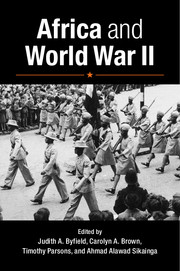Book contents
- Frontmatter
- Dedication
- Contents
- List of Contributors
- Acknowledgments
- Preface
- ONE INTRODUCTION
- TWO COLONIAL SUBJECTS AND IMPERIAL ARMIES
- 4 The Military, Race, and Resistance: The Conundrums of Recruiting Black South African Men during the Second World War
- 5 The Moroccan “Effort de Guerre” in World War II
- 6 Free to Coerce: Forced Labor during and after the Vichy Years in French West Africa
- 7 No Country Fit for Heroes: The Plight of Disabled Kenyan Veterans
- THREE MOBILIZING COMMUNITIES AND RESOURCES FOR THE WAR EFFORT
- FOUR RACE, GENDER, AND SOCIAL CHANGE IN A TIME OF WAR
- FIVE EXPERIENCING WAR IN AFRICA AND EUROPE
- SIX WORLD WAR II AND ANTICOLONIALISM
- SEVEN CONCLUSION
- Index
6 - Free to Coerce: Forced Labor during and after the Vichy Years in French West Africa
from TWO - COLONIAL SUBJECTS AND IMPERIAL ARMIES
Published online by Cambridge University Press: 05 May 2015
- Frontmatter
- Dedication
- Contents
- List of Contributors
- Acknowledgments
- Preface
- ONE INTRODUCTION
- TWO COLONIAL SUBJECTS AND IMPERIAL ARMIES
- 4 The Military, Race, and Resistance: The Conundrums of Recruiting Black South African Men during the Second World War
- 5 The Moroccan “Effort de Guerre” in World War II
- 6 Free to Coerce: Forced Labor during and after the Vichy Years in French West Africa
- 7 No Country Fit for Heroes: The Plight of Disabled Kenyan Veterans
- THREE MOBILIZING COMMUNITIES AND RESOURCES FOR THE WAR EFFORT
- FOUR RACE, GENDER, AND SOCIAL CHANGE IN A TIME OF WAR
- FIVE EXPERIENCING WAR IN AFRICA AND EUROPE
- SIX WORLD WAR II AND ANTICOLONIALISM
- SEVEN CONCLUSION
- Index
Summary
Shortly after the end of the Second World War, administrators in the French Soudan began complaining about numerous incidents of African men deserting their worksites and going to military bases to enlist, boarding trains without authorization, and in other ways causing disruptions. When asked why they demanded free passage on trains or why they wanted to sign up for the army, the men expressed a desire to be treated with the same respect as that given soldiers who had returned from the war. Their complaints came at a time when most West Africans had reason to celebrate major changes in colonial rule. By 1946, new laws brought about an end to forced labor and a separate legal code for colonial subjects; many considered these an overdue reward for the significant contributions Africans had made to the war. But not everyone enjoyed the fruits of these recent political changes. African members of a quasimilitary service known as the deuxième portion du contingent militaire (second portion of the military contingent) found that little had changed for them. Since its origins in 1926, men recruited into the deuxième portion had considered it to be a form of forced labor. Their distaste for the service only increased during the war, particularly during the Vichy period, when colonial administrators were freer than they had been in decades to coerce Africans. While the war years had been difficult for everyone, the postwar years seemed to hold promise for many, but when the men in the deuxième portion realized that the changing political order did not apply to them, they found new ways to express their anger.
Initially, French colonial administrators began recruiting men into the deuxième portion to provide cheap labor to the Dakar-Niger Railroad, the Office du Niger, and other public works projects, primarily in the French Soudan. The men who designed this service argued that the conditions in the worksites and campsites were well regulated and that, therefore, the deuxième portion was somehow different from previous forms of coercion.
- Type
- Chapter
- Information
- Africa and World War II , pp. 109 - 126Publisher: Cambridge University PressPrint publication year: 2015
- 1
- Cited by

